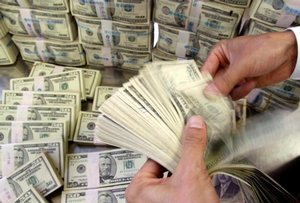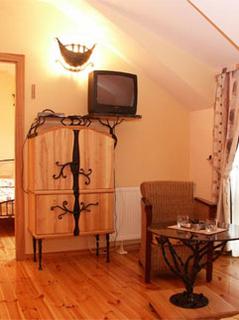It is the only source that can provide a chance for economic breakthrough
Published:
21 March 2005 y., Monday
Money from Russia’s Stabilisation Fund is expected to be invested abroad in dollar-nominated securities, with minimum investment risks and minimum profitability at 2-4%. These funds have until now been kept in Central Bank accounts. This means that a great deal of money will soon appear on the financial markets. On February 1, 2005, the Fund totaled 647.2 billion roubles ($23.1 billion), which mostly came from taxes on oil sales with prices exceeding $20 per barrel and export duties from oil companies.
The crucial question is how this money should be used. Money can only be taken out of the Fund when it has more than 500 billion roubles. Therefore, more than a fifth of its resources can already be used. This is a key issue for Russia’s economy, as the positive overseas market situation in recent years has been almost exclusively responsible for its growth.
However, experts are not tired of repeating that the potential of the resource-oriented Russian economy has been virtually exhausted. The mechanism whereby "we produce oil, sell it and enjoy the benefits" is becoming increasingly less effective. The country is now at a stage when it must introduce an industrial policy. However, any policy only makes sense when there is money to implement it.
Russia’s stock market and banking system do not provide the necessary financing for the real sector of the economy. Direct foreign investment in Russia remains at a very low level, while foreign investment in general is concentrated on either the import of equipment or foreign borrowings. The country obviously needs sources for further growth. The Stabilisation Fund is virtually the only potential source today and a genuine war is being waged for its funds.
Šaltinis:
financialexpress.com
Copying, publishing, announcing any information from the News.lt portal without written permission of News.lt editorial office is prohibited.
The most popular articles
 On 31 August 2009 in a non-public way AB Bank SNORAS issued the emission of perpetual debt securities included into the bank capital amounting to LTL 72.5 million.
more »
On 31 August 2009 in a non-public way AB Bank SNORAS issued the emission of perpetual debt securities included into the bank capital amounting to LTL 72.5 million.
more »
 The European Commission, through its longstanding cooperation with the US and Canada, announces the launch of 33 new and innovative projects involving universities and training institutions on both sides of the Atlantic.
more »
The European Commission, through its longstanding cooperation with the US and Canada, announces the launch of 33 new and innovative projects involving universities and training institutions on both sides of the Atlantic.
more »
 Today at the VII World Congress on Alternatives and Animal Use in the Life Sciences in Rome, the European Commission and the European cosmetic industry presented their joint financial effort for research into alternative safety testing methods.
more »
Today at the VII World Congress on Alternatives and Animal Use in the Life Sciences in Rome, the European Commission and the European cosmetic industry presented their joint financial effort for research into alternative safety testing methods.
more »
 SEB Bank, the largest bank in Lithuania, invests almost LTL 4.6 million in to the upgrade of its data transmission network.
more »
SEB Bank, the largest bank in Lithuania, invests almost LTL 4.6 million in to the upgrade of its data transmission network.
more »
 The World Bank’s Board of Executive Directors today approved a credit of US$ 36.6 million equivalent of additional financing for the Lifeline Road Improvement Project for Armenia.
more »
The World Bank’s Board of Executive Directors today approved a credit of US$ 36.6 million equivalent of additional financing for the Lifeline Road Improvement Project for Armenia.
more »
 The Executive Board of the International Monetary Fund (IMF) today completed the first review of Latvia's performance under an economic program supported by a 27-month Stand-By Arrangement.
more »
The Executive Board of the International Monetary Fund (IMF) today completed the first review of Latvia's performance under an economic program supported by a 27-month Stand-By Arrangement.
more »
 The Commission has today decided to close the formal investigation procedure into the privatisation and restructuring of Austrian Airlines concluding that the restructuring following its sale to Lufthansa is compatible with community law.
more »
The Commission has today decided to close the formal investigation procedure into the privatisation and restructuring of Austrian Airlines concluding that the restructuring following its sale to Lufthansa is compatible with community law.
more »
 Ben Bernanke's reappointment as head of the Federal Reserve did not come as a surprise, but Wall Street still responded with the proverbial thumbs up.
more »
Ben Bernanke's reappointment as head of the Federal Reserve did not come as a surprise, but Wall Street still responded with the proverbial thumbs up.
more »
 Over I half-year 2009 accommodation establishments had by 22 per cent less guests.
more »
Over I half-year 2009 accommodation establishments had by 22 per cent less guests.
more »
 In the first such transaction in Russia, carbon credits generated by utilising gas which would otherwise be flared at an oilfield in eastern Siberia are to be purchased through a carbon fund set up by the EBRD and the European Investment Bank (EIB), the Multilateral Carbon Credit Fund (MCCF).
more »
In the first such transaction in Russia, carbon credits generated by utilising gas which would otherwise be flared at an oilfield in eastern Siberia are to be purchased through a carbon fund set up by the EBRD and the European Investment Bank (EIB), the Multilateral Carbon Credit Fund (MCCF).
more »